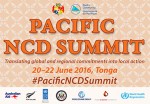The Pacific Community convened a summit on non-communicable diseases (NCDs), where participants called for addressing NCDs as a development issue, and highlighted their impacts in many areas beyond the health sector.
It also reviewed how Pacific Island countries and territories are implementing the SAMOA Pathway and the Sustainable Development Goals (SDGs).
 22 June 2016: The Pacific Community convened a summit on non-communicable diseases (NCDs), where participants called for addressing NCDs as a development issue, and highlighted their impacts in many areas beyond the health sector. It also reviewed how Pacific Island countries and territories are implementing the SAMOA Pathway and the Sustainable Development Goals (SDGs).
22 June 2016: The Pacific Community convened a summit on non-communicable diseases (NCDs), where participants called for addressing NCDs as a development issue, and highlighted their impacts in many areas beyond the health sector. It also reviewed how Pacific Island countries and territories are implementing the SAMOA Pathway and the Sustainable Development Goals (SDGs).
The Pacific NCD Summit was the first regional meeting of its kind, jointly organized by the Governments of Australia, New Zealand and Tonga, with the World Bank, the World Health Organization (WHO) and the UN Development Programme (UNDP). The Summit convened in Tonga, from 20-22 June 2016, on the theme of ‘Translating Global and Regional Commitments into Local Action.’ More than 120 high-level delegates took part in the summit, including ministers of health from approximately 14 Pacific countries.
Opening the summit, Tupou VI, King of Tonga, stressed the high priority given to tackling NCDs in Tonga’s national agenda, highlighting its five-year strategy, and the important roles of local churches and the Tonga Health Promotion Foundation. According to a Pacific Community (SPC) press release, Tonga was the first country in the world to develop an NCD strategy, in 2004.
In the keynote address, UN Development Programme (UNDP) Helen Clark noted that the challenge of NCDs disproportionately affects Pacific Island nations, citing WHO information that 40% of Pacific Islanders are diagnosed with an NCD, including heart disease, cancers, diabetes and chronic respiratory disease, many before the age of 40. She observed that NCDs are “clearly no longer unique to wealthy countries and aging populations.” She highlighted the Pacific Regional NCD Roadmap, and suggested that the 2030 Agenda for Sustainable Development could act as a springboard to its implementation. Clark welcomed some Pacific countries’ high taxes on tobacco and sugar and lower taxes on fresh produce. She said NCDs directly affect the economy, employment and education opportunities, and cautioned against industry interference in policy making on trade, investment and commerce.
On implementation, Clark noted several examples of cooperation: working with the WHO to make “the economic case” at the national level for investing in NCD prevention and control, with work already underway in Fiji; using Global Environment Facility (GEF) funding to enhance capacity to manage climate-related health risks in Kiribati, Solomon Islands, Tuvalu, and Vanuatu; and working with national health programmes in the Pacific to link NCD responses with HIV, tuberculosis (TB) and malaria responses, and to address the social determinants of health. On financing, she called for a greater focus on NCD prevention, and noted that the UN System Chief Executives Board (CEB) has proposed the development of a Pacific Trust Fund for NCDs.
SPC Director-General Colin Tukuitonga urged further action to address tobacco use, utilization of taxes to support behavior change, and better monitoring of progress, including establishing timelines for regional and national level action on Regional NCD Roadmap targets. SPC launched a ‘Pasifika Plates’ cookbook to promote healthy eating and a “grow local, eat local” message at the Summit.
Also in June, some Pacific Island countries held national consultations on sustainable development. The UN Economic and Social Commission for Asia and the Pacific (ESCAP) and the Government of Fiji organized a consultation in Suva, Fiji, on 15 June, with a focus on reducing inequalities, including issues of youth unemployment, gender inequality and violence against women. The meeting discussed the findings of an ESCAP report, ‘Time for Equality: The Role of Social Protection in Reducing Inequalities in Asia and the Pacific.’ The report notes that out-of-pocket health expenditures in the region are among the highest in the world, with 80% of the population having no access to affordable health care.
In addition, a national consultation on sustainable development took place in Kiribati on 17 June, co-organized by ESCAP and the Government of Kiribati. [SPC Press Release on Summit] [Summit Webpage] [King of Tonga Statement] [Helen Clark Statement] [Colin Tukuitonga Statement] [SPC Press Release on Pasifika Plates] [ESCAP Press Release] [ESCAP Report: Time for Equality]